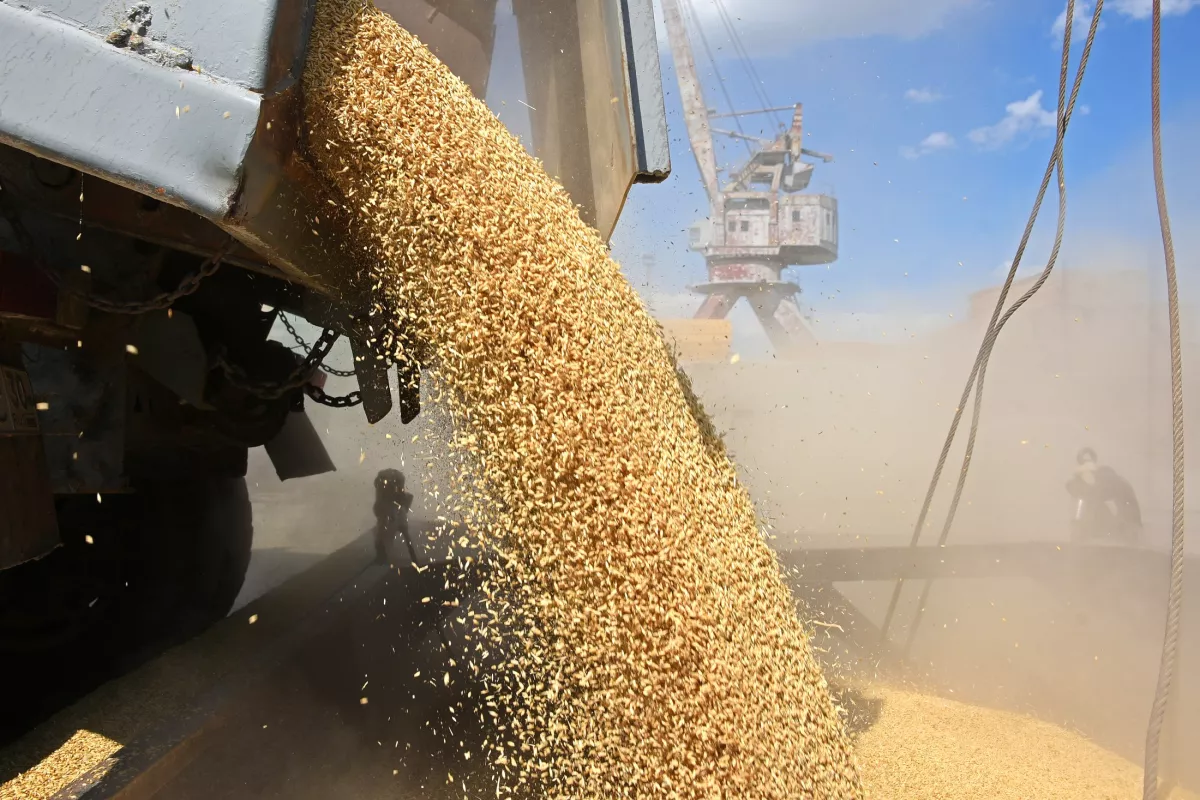Russian attacks on Ukrainian ports have significantly reduced the country’s food export capacity this month, raising concerns over declining global grain supplies and forcing some exporters to default on contracts.
Ukraine, one of the world’s largest exporters of wheat, corn, and sunflower oil, has seen near-daily drone and missile strikes on ports in the Odesa region in recent weeks.
These attacks have disrupted operations at key export terminals, despite ongoing efforts to divert shipments through rail and river routes.
According to Ukraine’s farmers’ union, at least one of the country’s three main export ports is either completely idle or operating at just 20% capacity.
The union reported that the attacks have already led to missed wheat deliveries and delays in fulfilling export contracts scheduled for December.
Ukraine had resumed most of its food exports in 2023 after a de facto Russian blockade earlier in the war worsened global food shortages. However, the latest escalation has once again weakened the country’s export potential.
Damage to logistics routes linking inland regions to Danube River ports has further strained exports. These river ports had previously helped compensate for limited access to major seaports.
The farmers’ union said the continued targeting of both deep-water and river ports would lead to a sharp decline in exports. It added that some major trading companies have begun reallocating grain shipments through railway terminals, with more cargo expected to be sent toward land borders instead of seaports.


Agri-Pulse’s Oliver Ward reported that “the Agriculture Department is projecting that the ag trade deficit will shrink in FY2026 even more than previously anticipated. USDA expects the trade deficit to fall from $43.7 billion in FY2025 to $37 billion in FY2026, according to its quarterly trade forecast published Tuesday. In its previous report issued in August, USDA had projected a trade deficit of $41.5 billion this fiscal year.”
“The U.S. recorded trade deficits of around $32 billion in FY2024 and $17 billion in FY2023, respectively,” Ward reported. “The quarterly trade forecast, published by the Economic Research Service, had been scheduled for publication last month, but was delayed due to the government shutdown.”
“Driving the adjusted outlook are larger-than-expected exports. USDA now expects $173 billion in ag exports for FY2026, up from the $169 projected in August. But even with the revision, exports are still set to contract year-over-year, after the U.S. recorded $175.6 billion in exports in FY2025,” Ward reported. “Ag imports are also set to fall from $219.4 billion during the last fiscal year to $210 billion in FY2026.”
“A significant portion of the better outlook can be attributed to improvements in the Chinese market. USDA revised U.S. ag export prospects to China upwards by $3 billion from the August to December releases,” Ward reported. “Exports to South Korea, Japan, Mexico and Southeast Asia also all posted small increases from August’s forecast.”
Armenia will once again extend restrictions on the export of grain and related products for a further six months, according to a decision adopted at a government meeting on December 25.
The measures apply to exports of wheat, barley, corn, buckwheat, sunflower seeds and sunflower oil, Caliber.Az reports, citing Armenian media.
The government said the extension reflects Armenia’s continued reliance on imports to meet domestic demand. The country produces around one-third of the grain it consumes, with the remainder imported, mainly from Russia. Sunflowers are not cultivated domestically.
The six-month extension represents the maximum period allowed for trade restrictions under the rules of the Eurasian Economic Union.


Argentina's trajectory shows how a country that led global agriculture, surpassed Brazil for decades, and was a symbol of prosperity, managed to dismantle its own productive base through flawed macroeconomic choices, affecting income, production, and food security.
Argentina was once among the world's richest economies, led agricultural exports, and symbolized prosperity. Today, it faces hyperinflation, growing poverty, and a loss of competitiveness, trying to find its way back after decades of misguided macroeconomic decisions.
The beginning of the 20th century and the Argentine boom.
At the beginning of the 20th century, Argentina had a per capita income comparable to that of Germany and higher than that of Spain, Italy, and Switzerland. It was the largest economy in South America and the sixth largest in the world.
The country earned the title of breadbasket of the world without exaggeration. It continuously exported food to Europe, Africa, and Asia, supported by deep soils, a temperate climate, predictable rainfall, and high agricultural productivity.
The strategic relationship with the United Kingdom boosted the livestock sector. For decades, almost half of the meat consumed in London came from Argentinian ports, transported by modern refrigerated ships.
Wheat, corn, wool, beef, and dairy products consolidated its agricultural leadership. Argentine meat processing plants were among the most advanced in the Southern Hemisphere, integrated with efficient and innovative logistics.
The Port of Rosario became a strategic corridor for grain exports. The infrastructure was supported by an extensive railway network, one of the largest in the world in the 1920s.
Today, only a third of that network remains operational. This deterioration encapsulates the so-called Argentine cost, characterized by poor logistics, expensive energy, high taxation, and constant regulatory instability.
US President Donald Trump is considering ending the United States-Mexico-Canada Agreement (USMCA) and negotiating a new agreement while major industry groups are pushing for it to be renewed for another full 16-year term, according to a FreightWaves report.
In a 5 December podcast with Politico’s White House bureau chief Dasha Burns, US Trade Representative Jamieson Greer was quoted as saying “the president’s view is he only wants deals that are a good deal.
The reason why we built a review period into USMCA was in case we needed to revise it, review it or exit it”.
Greer told Politico that Trump had also raised the idea of negotiating separately with Canada and Mexico and dividing the agreement into two parts.
The USA, Mexico and Canada were preparing for the first six-year joint review of the USMCA in 2026, FreightWaves wrote.
Negotiated during Trump’s first term as president, the USMCA replaced the North American Free Trade Agreement in 2020.
Despite the possibility of the USA withdrawing from the trade pact, several trade and business organisations said USMCA had become a cornerstone of North American economic integration, the 7 December report said.
During a series of public hearings at a USMCA panel in Congress, trade associations, including the National Grain and Feed Association (NGFA) had voiced strong support for maintaining USMCA’s duty-free market access and existing rules of origin, FreightWaves wrote.
NGFA had pressed for a full renewal without altering the agreement’s core terms, citing the essential role Mexico and Canada played as US export markets for corn, soyabeans and wheat, the report said.
“Mexico and Canada are two of the most important export markets for US corn, soyabeans, wheat and other commodities,” NGFA President and CEO Mike Seyfert said in his testimony.
“Mexico, in particular, purchased more than US$12bn in US grain and oilseed products last year and is expected to surpass China as our largest export customer.”


Ukrainian sunflower seed processors remain in high demand for raw materials at the end of the year. A significant part of the plants enter 2026 with an insufficient level of coverage, Spike Brokers reports.
“Expectations of possible logistical complications are prompting companies to take a wait-and-see approach and reduce the pace of processing,” the report says.
Against the backdrop of a decrease in processing activity before the New Year period, sunflower prices have decreased: the spot index with delivery for processing within 30 days fell by $14 including VAT to $672/t.
At the same time, sunflower oil prices in six ports in Northern Europe increased by $20 and reached $1,340–1,345/t (as of the end of last week).
On the Turkish side, the market remains stable — demand is maintained at $1,300–1,305/t.
The Pakistan government has authorised imports of genetically engineered (GE) canola and soyabeans in 2025/26 to meet domestic crushing demand in the face of limited production, according to a US Department Agriculture (USDA) report.
Imports of GE canola for food, feed and processing were authorised by the Pakistan National Biosafety Committee (NBC) in November and GE soyabean import licences had also been renewed by Pakistan’s Environmental Protection Agency (EPA) for another year, the USDA’s Foreign Agricultural Service (FAS)’s 12 December “Pakistan - Oilseeds and Products Update” said.
Following the move, soyabean imports were expected to increase to 2.4M tonnes in 2025/26, up from 1.95M tonnes the previous year.
Despite the introduction of programmes to promote soyabean cultivation, the country’s harvest is expected to reach only 1,000 tonnes in 2025/26, according to the report.
“Large-scale commercial planting has yet to materialise, and the sector remains far from achieving a scale that could meaningfully reduce Pakistan’s heavy reliance on soyabean imports in the foreseeable future,” the USDA said.
Brazil was Pakistan’s leading soyabean supplier for Pakistan in 2024/25 at 1.38M tonnes, followed by the USA at 294,000 tonnes and Ukraine at 256,000 tonnes.
Pakistan’s soyabean meal production for 2025/26 was forecast at 1.85M tonnes, a 31% increase from the previous year.
The projected rise in meal production was due to stable soyabean availability and expected strong demand from feed mills during the marketing year.
Due to tight soyabean supplies over the two years prior to the report, industry had imported soyabean meals to meet domestic demand, the USDA said.
With the availability of soyabean imports for crushing fully restored at the time of the report, no soyabean meal imports were expected in 2025/26.


The EU agri-food trade surplus increased sharply in October 2025, reaching EUR 6.4 billion. This represents an 18% increase compared to September and represents the highest monthly surplus in more than a year. The surplus was 19% higher than in October of last year.
Between January and October 2025, the cumulative EU agri-food surplus stood at EUR 42 billion. However, this remains EUR 12.5 billion lower than in the same period of 2024, largely reflecting constantly high import prices, in particular for cocoa and coffee.
EU agri-food exports reached a record monthly level in October, supported by strong month-on-month growth and continued price increases.
EU agri-food exports reach record level
In October 2025, EU agri-food exports climbed to a record EUR 20.7 billion, an increase of 7% compared to September and 1% higher than in October 2024. By October, cumulative exports for 2025 came to EUR 199.4 billion, up EUR 3.1 billion (+2%) compared to the same period last year.
Export growth continued to be driven primarily by high prices for cocoa-based products and coffee. At the same time, exports of cereals declined, reflecting lower volumes.
EU agri-food imports remain elevated despite a year-on-year decline
EU agri-food imports amounted to EUR 15.4 billion in October 2025, 4% higher than in September but 5% lower than in October 2024. Despite the year-on-year decline in October, cumulative imports between January and October reached EUR 157.4 billion, an increase of EUR 15.5 billion (+11%) compared with the same period in 2024.
The increase in cumulative imports continued to be driven by high global prices, particularly for cocoa and coffee, rather than higher volumes.